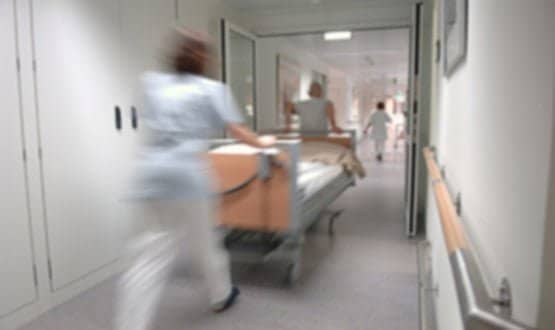GPs refuse to support electronic referrals over patient care fears
- 18 May 2018

Members of the Kent Local Medical Committee (LMC) have expressed concerns the area’s imminent paper switch off for consultant-led first outpatient appointments will “compromise patient care”.
In an open letter to NHS Digital and local NHS organisations, the chair of the committee said it would not support the switch off of paper referral systems for initial outpatient appointments with a consultant.
Medway NHS Foundation Trust is due to go paper-free for these referrals in May, while Dartford and Gravesham NHS Trust’s deadline is July and East Kent Hospitals University NHS Foundation Trust is August.
The issue was discussed at a full LMC committee meeting in April.
The letter comes from Gaurav Gupta, the chair of the committee, and is addressed to the chief executives at local hospital trusts; managing directors, accountable officers and clinical chairs at local CCGs; to all Kent and Medway GP practices; and to NHS Digital.
It says the LMC will not agree to support use of the e-Referral Service (eRS) for consultant-led first outpatient appointments until:
- All GPs and their staff are satisfied that they have been trained to use eRS
- There is a complete and adequately updated directory of services, with available appointment slots
- There is a backup system for use when there is an IT failure
- Arrangements are in place to meet the needs of practices with connectivity problems and who cannot access eRS
- The medico-legal aspects of this system are fully addressed by all concerned
Liz Capp-Gray, acting director of IT at Medway NHS Foundation Trust, said local CCGs in the area are working with GPs to “ensure” staff have the “skills and IT infrastructure” to use the e-Referral system.
She added: “Since our ‘soft switch-off’ of hard copy referrals a few weeks ago, where we continued to accept both electronic and non-electronic referrals, we have seen the majority of referrals from GPs come through the e-referral system.
“We are continuing to talk to our colleagues in primary care and address the issues that they have raised and are hoping to implement our ‘hard switch-off’, where we will no longer accept non-electronic referrals, in the next few weeks.
“To ensure patient safety, however, we will continue to accept non-electronic referrals for patients who are undergoing care for suspected cancer for the immediate future.”
In March, Digital Health News reported on how the new GP contract for 2018/19 would ensure an extra £10 million would be spent on the implementation of e-RS to ensure it is available at every practice by October 2018 – and that provider trusts would not been paid for consultant-led first outpatient appointments resulting from a paper referral.





9 Comments
Looking good
Put people first, get them on to their pathway as quickly as possible.
These seem very sensible caveats.
Especially the medico-legal one – who takes the blame for the missed cancer diagnosis when the vetting admin or perhaps algorithm has rejected the referral.
I get the feeling that people hate GPs for some reason.
GPs work independently, so if something goes wrong the GP and the GP alone gets the blame. So if GPs have concerns, it’s because they’re worried that they’ll lose their job.
It may be worthwhile for people to have a look at this article if they’re truly interested in how GPs see the situation: http://www.pulsetoday.co.uk/news/commissioning/commissioning-topics/referrals/gps-told-to-hold-urgent-referrals-after-it-issue-prevents-electronic-referrals/20036727.article
No-one hates GPs, but many of us do hate hypocrisy.
When the 2012 Act “put GPs in charge” via the CCGs, many of them forced through hefty punitive CQUIN penalties against Provider Trusts if they weren’t sending 100% of discharge letters electronically to GPs within 6 months.
In my area, none of the five pre-conditions listed in the article were considered, not even when we asked questions like “do you realise we don’t have an EPR and our out-dated PAS doesn’t have eDischarge functionality? or what happens if a GP system is unavailable for several days due to known local connectivity issues at Dr X’s practice?”. The response was “we are now your commissioners, if we tell you we want something by September, that is when it will be delivered or your income will be reduced by several hundred thousand pounds.”
Funny how most CCGs and their GPs were so keen to receive discharge letters electronically and even set punitive CQUIN targets to enforce this, yet seem so reluctant for information flowing in the other direction to be done electronically.
Then again having seen the quality of some hand-written “referral letters” (many not even containing the most basic basic demographic data) faxed to Acute Trusts I’m un-surprised.
This report by the Kings Fund* recognised that failure to stick to even basic guidelines is a real issue. At least e-Referrals give a consistent structure to the information to be contained in a referral.
* https://www.kingsfund.org.uk/sites/default/files/Diagnosis%20and%20referral.pdf
to be honest GPs NOW offer a completely uneven service, some good, some bad, this is largely down to matters of IT. ps GPs do not work alone, they are part of an integrated care approach, an approach which requires firstly and fore-mostly, the DATA to be integarted, that is why eRs is NOW critical.
While I support the idea of all GP -> other providers being electronic but until the referral letter can get from the GP to consultant desk without hospital admins printing (or print + scan) the letters at 50% of trusts this should be a no go.
Secondly on a technical side, eRS needs to split out the referrals from the appointments system. At present the eRS appointment constraints are limiting the functionality of the system.
Lastly the new eRS FHIR api needs to be modernised to use modern security methods (not NPfIT) and NHS FHIR standards.
I’d be interested to know whether Dr Gupta and his colleagues:
• Can provide evidence that GPs and their staff are satisfactorily trained in the current paper based processes
• Currently have a complete and adequately updated directory of services, with available appointment slots
• Have backup system for when the letter/fax does not arrive
• Have asked practice managers to ensure arrangements are in place to meet the needs of practices with connectivity problems and who cannot access eRS
• Can guarantee the medico-legal aspects of the current process have been fully addressed by all concerned.
e-RS has been a long time coming, it’s benefits are obvious and most GP practices will have been proactive in ensuring they are in a position to use it (training, connection etc) and will have engaged with Trusts to ensure they have set the system up appropriately from their side. It’s a bit late in the day for feet dragging and the blame game.
Comments are closed.